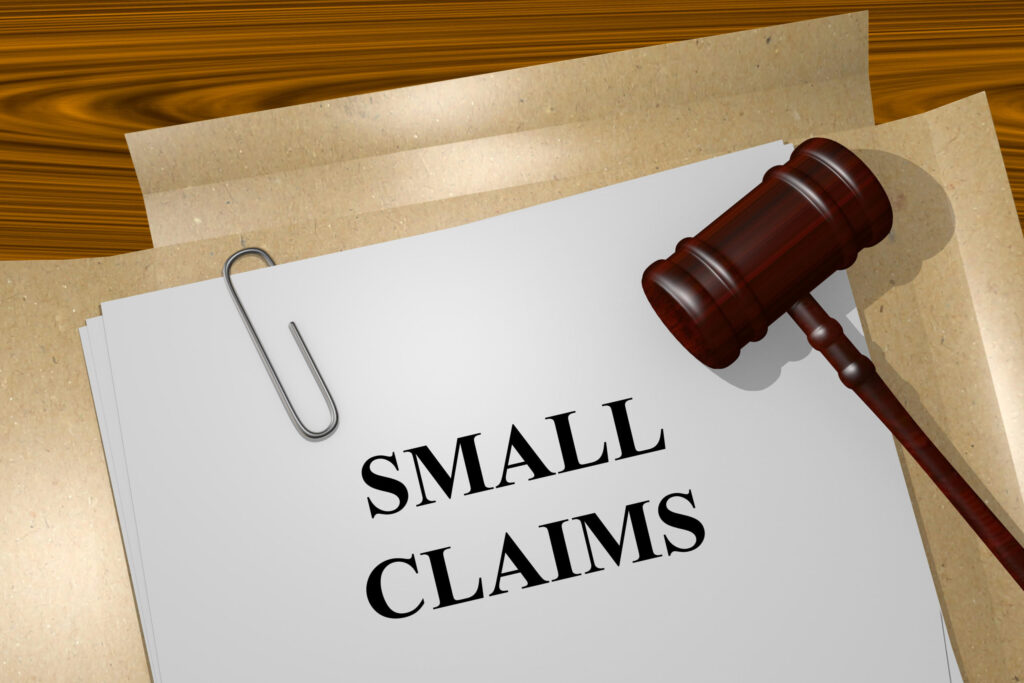Table of Contents
Small Claims Court Lawyers: Helping You Navigate Disputes up to $100,000
When faced with a legal dispute involving a relatively small amount of money, it might seem overwhelming to navigate the legal system alone. Fortunately, the Small Claims Court exists as a forum to resolve these issues efficiently without the complexities of more formal litigation. At SK Legal, our team of small claims court lawyers is here to help you understand the process and present your case effectively.
What is Small Claims Court?
Small Claims Court is designed to deal with disputes involving smaller amounts of money. It’s a straightforward legal process that allows individuals and businesses to seek justice in civil matters, usually without the need for a formal trial. Each province or territory in Canada has its own rules about what constitutes a small claim, but typically, the monetary limit ranges from $5,000 to $35,000.
The benefit of small claims court is that it offers a quicker, more affordable way to resolve disputes than other court systems. However, just because the process is designed to be simple doesn’t mean it’s easy to win without understanding the procedures and rules involved. This is where our small claims court lawyers come in.
Why You Might Need a Small Claims Court Lawyer
While the Small Claims Court is designed to be more accessible, it can still be challenging for those unfamiliar with legal procedures. Our experienced lawyers can help you by:
- Clarifying your legal rights: We’ll explain the laws relevant to your case and help you understand the strengths and weaknesses of your position.
- Guiding you through the process: The procedural steps in small claims court, from filing the claim to representing yourself at hearings, can be confusing. We simplify the process for you.
- Negotiating settlements: Many small claims cases can be resolved without ever going to court. Our lawyers will negotiate on your behalf to try and reach a fair settlement.
- Preparing your case: Properly gathering evidence and presenting it clearly is key to success in small claims court. We’ll help you organize your case to give you the best chance of winning.
The Small Claims Court Process
The steps involved in a small claims court case typically include:
- Filing the Claim: You begin by filing a claim against the other party. This involves submitting forms and paying a small fee. The defendant is then notified of your claim.
- Responding to the Claim: The defendant has a limited amount of time to respond. They can either agree with the claim, dispute it, or file a counterclaim against you.
- Discovery and Evidence Gathering: Both parties may exchange documents, witness lists, and other evidence. Having organized evidence is crucial for success.
- Mediation or Negotiation: Many courts encourage or require mediation to resolve disputes before going to trial. Our lawyers can assist in these negotiations to reach a fair settlement.
- Court Hearing: If no settlement is reached, the case will proceed to a hearing. Each side will present its case to a judge, who will then make a decision. While the rules are simplified, it’s important to be prepared. Our small claims court lawyers ensure your arguments are presented clearly and concisely.
- Judgment: Once the judge makes a decision, it is binding. If you win, the other party may be required to pay you damages or take other actions to rectify the situation.
Types of Cases Handled in Small Claims Court
Small Claims Court is typically used for cases involving:
- Unpaid debts: If someone owes you money and refuses to pay, you can file a small claim to recover the debt.
- Property damage: If your property has been damaged, you can seek compensation for repair or replacement.
- Breach of contract: If someone has failed to meet the terms of an agreement, you may sue for damages.
- Landlord-tenant disputes: Disputes over security deposits, unpaid rent, or property damage can often be resolved in small claims court.
- Unpaid wages: Employees can use Small Claims Court to recover unpaid wages from an employer.
Do I Need a Lawyer for Small Claims Court?
Technically, you are not required to have a lawyer in Small Claims Court, but having one can significantly improve your chances of a favorable outcome. A skilled lawyer will ensure your paperwork is correct, your evidence is presented clearly, and that your arguments are strong.
Here’s why hiring a lawyer for your small claim might be worth considering:
- Familiarity with legal procedures: Even small claims have rules that must be followed. Mistakes in filing or presenting your case can lead to delays or even dismissal.
- Objectivity: Emotions can run high during disputes, but a lawyer will maintain the objectivity needed to present your case clearly and persuasively.
- Time-saving: A lawyer can handle much of the work involved in preparing your case, saving you time and stress.
- Increased chance of settlement: Often, cases are settled before they ever reach the hearing stage. A lawyer can negotiate on your behalf to ensure any settlement is fair and in your best interest.
How SK Legal Can Help
At SK Legal, we understand the stress that legal disputes can cause. Our team of small claims court lawyers is here to guide you every step of the way, from evaluating your claim to presenting your case in court. Whether you are the plaintiff or the defendant, we’ll ensure your side of the story is heard and that you have the best chance of success.
We have extensive experience handling cases across a wide range of disputes and will tailor our approach to meet the unique circumstances of your case. Our goal is to resolve your dispute as quickly and affordably as possible.
Conclusion
Navigating Small Claims Court can be a daunting process, but with the right support, you can increase your chances of success. Our skilled small claims court lawyers will help you every step of the way, from filing your claim to negotiating a settlement or representing you in court.
Contact SK Legal today to discuss your case and see how we can help you achieve a fair resolution.

What is a Small Claims Court?
Small Claims Court is a simplified legal process designed for resolving disputes involving relatively small amounts of money, typically ranging from $5,000 to $35,000, depending on the province.
Do I need a lawyer for Small Claims Court?
While not required, having a lawyer can greatly improve your chances of success. A lawyer can help prepare your case, ensure compliance with legal procedures, and represent you effectively.
What types of cases can be filed in Small Claims Court?
Common cases include unpaid debts, property damage, breach of contract, landlord-tenant disputes, and unpaid wages.
How long does the Small Claims Court process take?
The timeline varies, but most cases are resolved within a few months. Delays can occur if the court is busy or if the case is particularly complex.
What happens if I lose my Small Claims Court case?
If you lose, you may be ordered to pay damages to the other party. You may also be required to cover their court costs in some cases.
Can I appeal a Small Claims Court decision?
Yes, you can appeal, but the grounds for appeal are limited. It would help if you generally showed that there was an error in applying the law.
How much does it cost to file a claim in Small Claims Court?
The filing fee varies by jurisdiction but is usually between $100 and $300. There may also be additional costs for serving the claim on the defendant.
What should I bring to my Small Claims Court hearing?
Bring all relevant evidence, including contracts, invoices, receipts, and photographs. Witnesses may also be helpful to support your case.
Can I settle my case before the hearing?
Yes, many small claims cases are settled through negotiation or mediation before they reach the hearing stage.
What happens if the defendant doesn’t pay after I win my case?
If the defendant fails to pay, you may need to take further legal action, such as garnishing their wages or placing a lien on their property, to enforce the judgment.
- Contract Law Across Countries (Canada and United States)
- Cross Border Services (United States and Canada)
- SK Legal – Contingency Engagements for 100% Success – Serving all of British Columbia and Alberta
- Navigating Personal Injury Claims with SK Legal as Your Trusted Lawyer in Alberta
- SK Legal: Your Trusted Lawyer for Personal Injury Claims in Alberta and British Columbia

